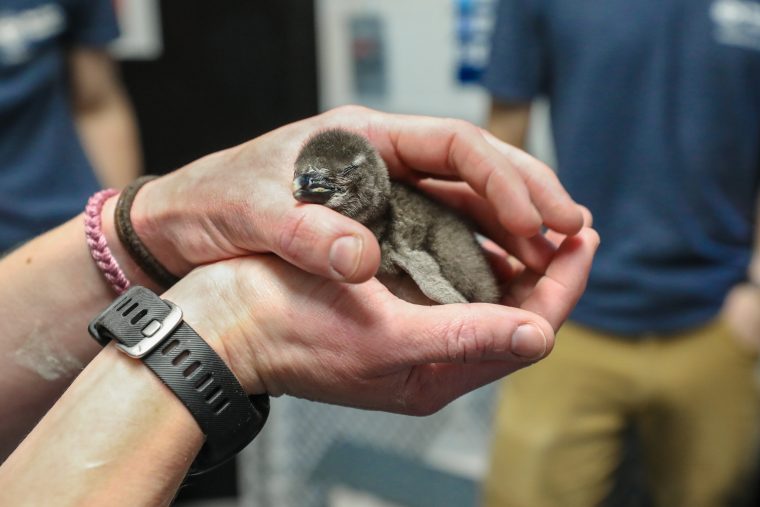BOSTON, MASS. (April 13, 2023) – The New England Aquarium is celebrating the arrival of an African penguin chick who hatched behind the scenes three weeks ago.
PHOTOS AND VIDEO AVAILABLE HERE WITH CREDIT TO NEW ENGLAND AQUARIUM
The chick, born to parents Malgas II and Demersus III, came into the world on March 23 and has been rapidly growing—it is now 16 times its hatch weight. Animal Care staffers, who are pleased with its progress so far, note there are still many milestones to go. They will be transitioning the bird to hand feeding in the coming weeks and helping it become accustomed to the daily routine of other penguins in the colony.
“Raising a penguin chick is no easy feat for us, or its parents! Months of planning, preparation, and hard work go into ensuring each chick has the best chance for success. It has been a while since we have had a new chick join our colony, so it is a huge win for our team and for this endangered species,” said Eric Fox, Assistant Curator of Penguins.
Once the penguin’s waterproof feathers come in, it will receive a full physical exam as well as a blood test to determine its sex before joining the rest of the penguin colony on exhibit, likely in June. At that point, staffers will also select a name with an educational or conservation tie.
The New England Aquarium participates in the African Penguin Species Survival Plan through the Association of Zoos and Aquariums (AZA), which supports field conservation efforts and a thoughtful breeding program to help promote a sustainable future for these endangered penguins. The Aquarium last engaged in African penguin breeding efforts in 2019. (The pandemic put this work on hold for the past three years.) Breeding gives the penguins a chance to go through an important life stage—pair-bonding, nesting, breeding, and rearing. Malgas II and Demersus III had been exhibiting mating behavior behind the scenes since January, with 15-year-old mom Malgas II laying an egg in February. The pair had already raised one chick together, and Malgas II has two other chicks with a previous mate.
“Having a breeding season has helped advance our knowledge of animal wellbeing and the impact breeding can have on an animal’s lived experience,” said Kristen Van Oss, Curator of Pinnipeds and Penguins.
The chick comes from a long line of African penguins at the Aquarium. Its great-grandmother is Deco, a 41-year-old penguin who hatched at the Aquarium in 1981. She has thrived and far exceeded the life expectancy of African penguins, who usually live 10 to 15 years in the wild. Deco is currently the oldest African penguin at the Aquarium and in the AZA’s Species Survival Plan.
African penguin colonies along the coasts of South Africa and Namibia are threatened by the depletion of food from overfishing, climate change, and pollution. Over the last 30 years, the number of African penguins breeding in South Africa has declined by 73% from 42,500 breeding pairs in 1991 to 10,400 pairs in 2021. To learn more about the AZA’s efforts to keep the African penguin from going extinct, visit the African penguin Saving Animals From Extinction (SAFE) website.
More information on the chick and its parents is available on the New England Aquarium Blog.
MEDIA CONTACT:
Pam Bechtold Snyder – psnyder@neaq.org, 617-686-5068

